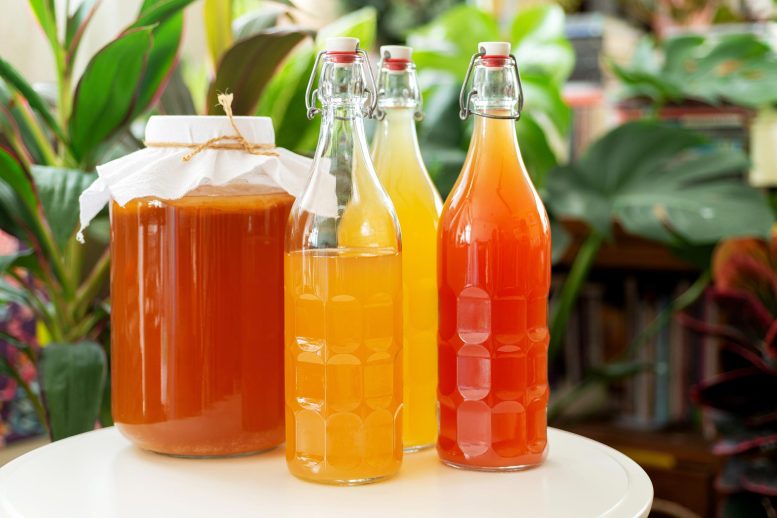
Small pilot study suggests larger trials are warranted to confirm the potential benefit of fermented tea.
People with type 2 diabetes who drank kombucha, the fermented tea drink, for four weeks had lower fasting blood glucose levels compared to when they consumed a similar-tasting placebo beverage. This is according to results from a clinical trial conducted by researchers at Georgetown University’s School of Health, the University of Nebraska-Lincoln and MedStar Health. This finding, from a pilot 12-person feasibility trial, points to the potential for a dietary intervention that could help lower blood sugar levels in people with diabetes and also establishes the basis for a larger trial to confirm and expand upon these results.
This finding was reported in the journal Frontiers in Nutrition on August 1, 2023.
History of Kombucha
Kombucha is a tea fermented with bacteria and yeasts and was consumed as early as 200 B.C. in China, but it did not become popular in the U.S. until the 1990s. Its popularity has been bolstered by anecdotal claims of improved immunity and energy and reductions in food cravings and inflammation, but proof of these benefits has been limited.
“Some laboratory and rodent studies of kombucha have shown promise and one small study in people without diabetes showed kombucha lowered blood sugar, but to our knowledge this is the first clinical trial examining effects of kombucha in people with diabetes,” says study author Dan Merenstein, M.D., professor of Human Sciences in Georgetown’s School of Health and professor of family medicine at Georgetown University School of Medicine. “A lot more research needs to be done but this is very promising.”
Study Design and Results
Merenstein continued, “A strength of our trial was that we didn’t tell people what to eat because we used a crossover design that limited the effects of any variability in a person’s diet.”
The crossover design had one group of people drinking about eight ounces of kombucha or placebo beverage daily for four weeks and then after a two-month period to ‘wash out’ the biological effects of the beverages, the kombucha and placebo were swapped between groups with another four weeks of drinking the beverages. Neither group was told which drink they were receiving at the time.
Kombucha appeared to lower average fasting blood glucose levels after four weeks from 164 to 116 milligrams per deciliter while the difference after four weeks with the placebo was not statistically significant. Guidelines from the American Diabetes Association recommended blood sugar levels before meals should be between 70 to 130 milligrams per deciliter.
Composition and Brand of Kombucha
The researchers also looked at the makeup of fermenting micro-organisms in kombucha to determine which ingredients might be the most active. They found that the beverage was mainly comprised of lactic acid bacteria, acetic acid bacteria, and a form of yeast called Dekkera, with each microbe present in about equal measure; the finding was confirmed with RNA gene sequencing.
The kombucha used in this study was produced by Craft Kombucha, a commercial manufacturer in the Washington, DC, area. It has been re-branded as Brindle Boxer Kombucha.
“Different studies of different brands of kombucha by different manufacturers reveal slightly different microbial mixtures and abundances,” says Robert Hutkins, Ph.D., University of Nebraska-Lincoln and the study’s senior author. “However, the major bacteria and yeasts are highly reproducible and likely to be functionally similar between brands and batches, which was reassuring for our trial.”
The Broader Context
“An estimated 96 million Americans have pre-diabetes — and diabetes itself is the eighth leading cause of death in the U.S. as well as being a major risk factor for heart disease, stroke, and kidney failure,” says Chagai Mendelson, M.D., lead author who was working in Merenstein’s lab at Georgetown while completing his residency at MedStar Health. “We were able to provide preliminary evidence that a common drink could have an effect on diabetes. We hope that a much larger trial, using the lessons we learned in this trial, could be undertaken to give a more definitive answer to the effectiveness of kombucha in reducing blood glucose levels, and hence prevent or help treat type 2 diabetes.”
Reference: “Kombucha tea as an anti-hyperglycemic agent in humans with diabetes – a randomized controlled pilot investigation” by Chagai Mendelson, Sabrina Sparkes, Daniel J. Merenstein, Chloe Christensen, Varun Sharma, Sameer Desale, Jennifer M. Auchtung, Car Reen Kok, Heather E. Hallen-Adams and Robert Hutkins, 1 August 2023, Frontiers in Nutrition.
DOI: 10.3389/fnut.2023.1190248
Additional study authors at Georgetown University are Sabrina Sparkes, a student in the School of Health, Varun Sharma and Sameer Desale. In addition to Hutkins, Chloe Christensen, Jennifer M. Auchtung, Car Reen Kok and Heather E. Hallen-Adams are at the University of Nebraska-Lincoln.
The authors wish to express their gratitude to Tanya Maynigo, founder of Craft Kombucha for providing the kombucha and placebo kombucha for this study. She teaches kombucha classes in Washington, DC, and this year is launching a new brand of her favorite drink called Brindle Boxer Kombucha.
The study received no external funding.
Hutkins is a co-founder of Synbiotic Health. Auchtung has a financial interest in Synbiotic Health. Merenstein is president of the International Scientific Association for Probiotics and Prebiotics board, a non-paid position. All other authors have no competing interests to declare. All kombucha and placebo drinks were donated by Craft Kombucha. Craft Kombucha did not have any access to data reported in this study. No author has any financial ties with Craft Kombucha.
Never miss a breakthrough: Join the SciTechDaily newsletter.
2 Comments
The best intervention for adult-onset diabetes is a drastic reduction in sweet and starch foods.
Was this kombucha w/o added sugar? I searched the article and the website but could not find any ingredient label.